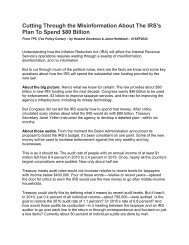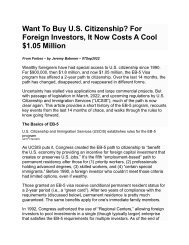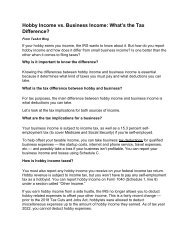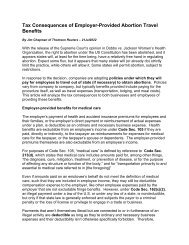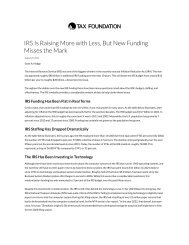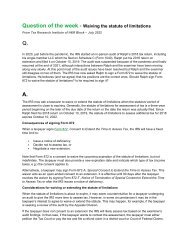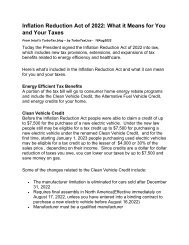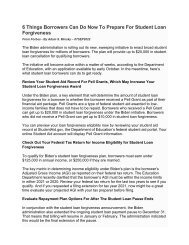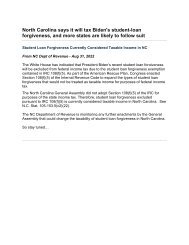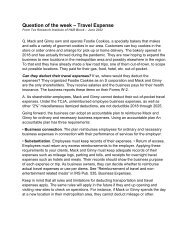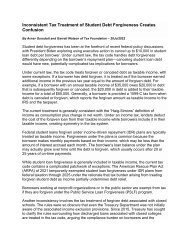Create successful ePaper yourself
Turn your PDF publications into a flip-book with our unique Google optimized e-Paper software.
<strong>Push</strong> <strong>for</strong> <strong>Higher</strong> <strong>Taxes</strong> <strong>is</strong> M<strong>is</strong>guided <strong>During</strong> a <strong>Time</strong> <strong>of</strong><br />
<strong>Inflation</strong> <strong>and</strong> <strong>Looming</strong> <strong>Recession</strong><br />
By William McBride <strong>of</strong> Tax Foundation – 27Jul2022<br />
The on-again-<strong>of</strong>f-again negotiations over the proposed Build Back Better tax increases<br />
on corporations <strong>and</strong> high-income earners appears to be… on again. Senator Joe<br />
Manchin (D-WV) <strong>is</strong> now expressing support <strong>for</strong> something called the <strong>Inflation</strong> Reduction<br />
Act <strong>of</strong> 2022, which includes a 15 percent corporate minimum tax, drug price controls,<br />
IRS tax en<strong>for</strong>cement, <strong>and</strong> a tax hike on carried interest to pay <strong>for</strong> increased spending on<br />
energy <strong>and</strong> health insurance subsidies as well as deficit reduction.<br />
Next week, the Senate <strong>is</strong> scheduled to begin voting on a reconciliation bill that may put<br />
all <strong>of</strong> the Build Back Better tax <strong>and</strong> spending increases on the table.<br />
Senator Manchin <strong>and</strong> other supporters seem to be operating under the flawed<br />
assumption that as long as the bill reduces the deficit it will reduce inflation. If only it<br />
were that simple. The real <strong>is</strong>sue <strong>is</strong> how it affects the economy, particularly at a time<br />
<strong>of</strong> looming global recession.<br />
Bad advice <strong>is</strong> coming from certain econom<strong>is</strong>ts who are perennially in favor <strong>of</strong> tax<br />
increases. Kim Clausing, who recently stepped down as one <strong>of</strong> the admin<strong>is</strong>tration’s top<br />
Treasury <strong>of</strong>ficials, claims that econom<strong>is</strong>ts have reached “near consensus” that “tax<br />
increases reduce inflation.” In fact, there <strong>is</strong> no such consensus on th<strong>is</strong> statement, since<br />
it depends on several things, including how the tax revenue <strong>is</strong> spent.<br />
Clausing further claims that as long as the taxes exceed spending then it will reduce<br />
inflation. Again, th<strong>is</strong> <strong>is</strong> far too simpl<strong>is</strong>tic. It depends on the type <strong>of</strong> taxes, the type <strong>of</strong><br />
spending, <strong>and</strong> how th<strong>is</strong> impacts the economy <strong>and</strong> the ability <strong>of</strong> the federal government<br />
to repay its debt over the long term.<br />
Indeed, by most accounts current inflation was ultimately caused to a large extent<br />
by spending—the federal government spent more than $5 trillion, or 27 percent <strong>of</strong> GDP,<br />
during the p<strong>and</strong>emic, on top <strong>of</strong> the usual spending, in the <strong>for</strong>m <strong>of</strong> stimulus checks,<br />
enhanced child credits, <strong>and</strong> other benefits. The splurge was debt financed, with the<br />
Federal Reserve purchasing much <strong>of</strong> that debt through money creation, without a state<br />
plan to repay the debt.<br />
As a result, we are now in a world <strong>of</strong> hurt that cannot be easily unwound. As we warned<br />
in January, the Federal Reserve <strong>is</strong> ra<strong>is</strong>ing interest rates to address the inflation but that<br />
generally brings about a recession. After four rounds <strong>of</strong> interest rate hikes among many<br />
more expected, the Atlanta Fed already <strong>for</strong>ecasts a shrinking economy in the second<br />
quarter, <strong>and</strong> about half <strong>of</strong> <strong>for</strong>ecasters are expecting a recession in the next 12 months.
In such conditions, it would be extremely unw<strong>is</strong>e to ra<strong>is</strong>e taxes, especially the type <strong>of</strong><br />
taxes advocated by th<strong>is</strong> admin<strong>is</strong>tration, which would do excessive harm to the economy.<br />
For example, applying the Net Investment Income Tax (NIIT) to active passthrough<br />
business income would reduce incentives <strong>for</strong> those companies to invest, grow, hire, <strong>and</strong><br />
ra<strong>is</strong>e wages. Likew<strong>is</strong>e with attempts to ra<strong>is</strong>e the corporate tax rate or target U.S.<br />
multinational corporations <strong>and</strong> certain industries with a complex set <strong>of</strong> minimum taxes.<br />
Clausing claims otherw<strong>is</strong>e, stating “the proposed tax increases will reduce after-tax<br />
pr<strong>of</strong>its <strong>for</strong> corporations <strong>and</strong> <strong>for</strong> certain wealthy individuals with pass-through businesses,<br />
but they won’t change the incentive to produce goods <strong>and</strong> services.” So then are we to<br />
believe companies produce goods <strong>and</strong> services out <strong>of</strong> the goodness <strong>of</strong> their hearts?<br />
Entrepreneurial spirits aside, econom<strong>is</strong>ts largely agree that companies are in business<br />
to earn money. Cutting into those earnings with higher taxes on normal returns will<br />
reduce incentives to produce goods <strong>and</strong> services <strong>and</strong> reduce associated income <strong>for</strong><br />
owners <strong>and</strong> workers.<br />
Similarly, ef<strong>for</strong>ts to penalize drug companies by controlling drug prices will have the<br />
undesirable effect <strong>of</strong> reducing drug innovation over time, ultimately reducing access to<br />
life-saving treatments <strong>and</strong> cures. The general push to ra<strong>is</strong>e capital gains <strong>and</strong> other<br />
taxes on high-income earners effectively d<strong>is</strong>courages saving in favor <strong>of</strong> consumption,<br />
harming long-term economic growth <strong>and</strong> aggravating inflationary pressures.<br />
In a time <strong>of</strong> economic weakness <strong>and</strong> inflation, it would be better to pursue tax re<strong>for</strong>ms<br />
with a proven track record <strong>for</strong> growing the economy over the long run, as we propose in<br />
our Growth <strong>and</strong> Opportunity Agenda. These include better treatment <strong>for</strong> capital<br />
investment, reducing the layers <strong>of</strong> tax on corporate income, reducing tariffs, broadening<br />
the individual income tax base <strong>and</strong> lowering marginal tax rates, <strong>and</strong> exp<strong>and</strong>ing savings<br />
account options.<br />
While pro-growth tax re<strong>for</strong>m <strong>is</strong> key, the country should also grapple with the<br />
unsustainable trajectory <strong>of</strong> debt by reining in spending. According to the latest<br />
<strong>for</strong>ecast from the Congressional Budget Office (CBO), federal spending will reach 23.5<br />
percent <strong>of</strong> GDP th<strong>is</strong> year <strong>and</strong> grow to 24.3 percent over the next 10 years—a level only<br />
exceeded during the p<strong>and</strong>emic <strong>and</strong> World War II, <strong>and</strong> far above the 50-year average<br />
level <strong>of</strong> 20.8 percent. Meanwhile, tax revenue <strong>is</strong> expected to reach 19.6 percent <strong>of</strong> GDP<br />
th<strong>is</strong> year, nearly an all-time high, <strong>and</strong> projected over the next 10 years to remain well<br />
above the 50-year average <strong>of</strong> 17.3 percent.<br />
Look to the last time th<strong>is</strong> country dealt with such high inflation combined with slow<br />
economic growth, some 40 years ago. While Paul Volcker’s Fed gets a lot <strong>of</strong> the credit,<br />
it was also Reagan-era tax <strong>and</strong> regulatory re<strong>for</strong>ms that set the economy on a long-term<br />
growth trajectory, contributing to a virtuous cycle in which the economy boomed,<br />
inflation came down, <strong>and</strong> spending growth slowed, ultimately resulting in budget<br />
surpluses by the late 1990s.
Note that deficits <strong>and</strong> debt actually increased in the 1980s, during the steepest decline<br />
<strong>of</strong> inflation, so it was not deficit reduction that directly led to reduced inflation. Rather it<br />
was faster economic growth that did it. As the economy continued to grow into the<br />
1990s while federal spending growth slowed, deficits came down. Then as now, the<br />
solution <strong>is</strong> a long-term focus on stronger economic growth <strong>and</strong> sustainable federal<br />
budgets.



